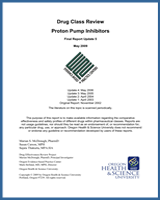NCBI Bookshelf. A service of the National Library of Medicine, National Institutes of Health.
This publication is provided for historical reference only and the information may be out of date.
Proton pump inhibitors (PPIs) decrease gastric acid and gastric secretory volume. PPIs are used to treat peptic ulcers (duodenal and gastric), symptoms of gastroesophageal reflux disease (GERD), erosive esophagitis, and drug-induced ulcers (e.g., non-steroidal anti-inflammatory drugs {NSAIDs}). The purpose of this review is to compare the benefits and harms of different PPIs.
Contents
- Introduction
- Methods
- Results
- Overall Summary
- References
- Appendixes
- Appendix A. Search Strategy
- Appendix B. Quality assessment methods for drug class reviews for DERP
- Appendix C. Placebo-controlled randomized trials of PPIs (not included)
- Appendix D. Abstract-only studies (not included)
- Appendix E. Results of search and selection of included articles
- Appendix F. Esophagitis grading scales used in randomized controlled trials
- Appendix G. Studies Currently Under Review / In-Process
- Evidence Tables
The funding source, the Center for Evidence-based Policy, is supported by 17 organizations, including 15 state Medicaid programs. These organizations selected the topic and had input into the Key Questions for this review. The content and conclusions of the review are entirely determined by the Evidence-based Practice Center researchers. The authors of this report have no financial interest in any company that makes or distributes the products reviewed in this report.
Suggested citation:
McDonagh MS, Carson S. Drug Class Review on Proton Pump Inhibitors. 2006. http://www.ohsu.edu/drugeffectiveness/reports/final.cfm
The purpose of this report is to make available information regarding the comparative effectiveness and safety profiles of different drugs within pharmaceutical classes. Reports are not usage guidelines, nor should they be read as an endorsement of, or recommendation for, any particular drug, use or approach. Oregon Health & Science University does not recommend or endorse any guideline or recommendation developed by users of these reports.
- Review Review article: physiologic and clinical effects of proton pump inhibitors on non-acidic and acidic gastro-oesophageal reflux.[Aliment Pharmacol Ther. 2006]Review Review article: physiologic and clinical effects of proton pump inhibitors on non-acidic and acidic gastro-oesophageal reflux.Miner PB Jr. Aliment Pharmacol Ther. 2006 Mar; 23 Suppl 1:25-32.
- Review New therapeutic options in the treatment of GERD and other acid-peptic disorders. Based on a presentation by Duane D. Webb, MD, FACG.[Am J Manag Care. 2000]Review New therapeutic options in the treatment of GERD and other acid-peptic disorders. Based on a presentation by Duane D. Webb, MD, FACG.. Am J Manag Care. 2000 May; 6(9 Suppl):S467-75.
- Review Proton pump inhibitors in the management of gastroesophageal reflux disease.[Med Arh. 2011]Review Proton pump inhibitors in the management of gastroesophageal reflux disease.Hrelja N, Zerem E. Med Arh. 2011; 65(1):52-5.
- Rapid metabolizer genotype of CYP2C19 is a risk factor of being refractory to proton pump inhibitor therapy for reflux esophagitis.[J Gastroenterol Hepatol. 2016]Rapid metabolizer genotype of CYP2C19 is a risk factor of being refractory to proton pump inhibitor therapy for reflux esophagitis.Ichikawa H, Sugimoto M, Sugimoto K, Andoh A, Furuta T. J Gastroenterol Hepatol. 2016 Apr; 31(4):716-26.
- The effectiveness of prophylactic proton pump inhibitors for prevention of non-steroidal anti inflammatory drugs associated gastric and duodenal ulcers in elderly.[Qual Prim Care. 2014]The effectiveness of prophylactic proton pump inhibitors for prevention of non-steroidal anti inflammatory drugs associated gastric and duodenal ulcers in elderly.Kheiri B, Mabrouk A, Ahmed I, Khan H, Sheikh AS. Qual Prim Care. 2014; 22(6):282-4.
- Drug Class Review: Proton Pump InhibitorsDrug Class Review: Proton Pump Inhibitors
Your browsing activity is empty.
Activity recording is turned off.
See more...

